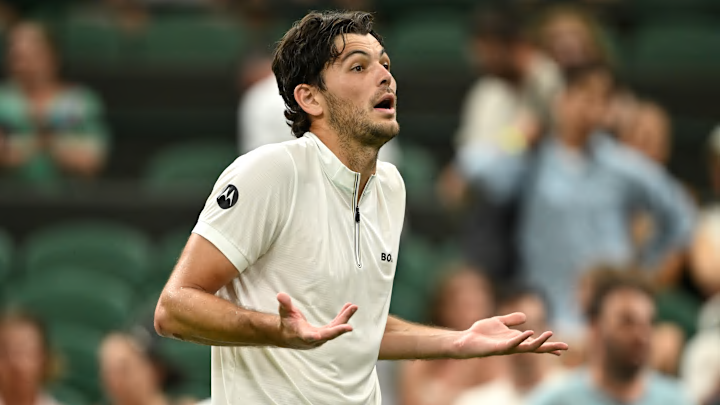It looked for all the world like Taylor Fritz was on the verge of an instantly iconic Wimbledon comeback. But any such hopes will have to wait until Tuesday morning after tournament officials made the controversial decision to suspend his opening-round match against Frenchman Giovanni Mpetshi Perricard due to darkness — a full 40 minutes prior to the 11 p.m. curfew.
The top-ranked American, who entered this week's fortnight as the No. 5 seed, did himself no favors. He dropped the first two sets, and while he was able to take the third set 6-4, he found himself down 5-1 in a fourth-set tiebreak — just two points away from a shocking Round 1 exit. But Fritz dug deep when he needed it most, storming back to win the tiebreak 8-6 and send things to a decisive fifth set. With the match now back on level footing and the crowd fully behind Fritz, it seemed like he had all the momentum he would need to finish the job.
And then, just like that, everything came to a screeching halt. The fourth set ended at around 10:20 p.m. local time, 40 minutes before tournament curfew at 11 p.m. While the players could very well have gotten one more set in before then — the third set had taken just 33 minutes, for example — Wimbledon officials ruled otherwise, opting to suspend the match right then and there rather than risk having to pause things at a crucial moment.
The crowd immediately made its displeasure known, and Fritz began pleading with match officials to no avail.
Taylor Fritz is livid as his match with Giovani Mpetshi Perricard is suspended due to curfew… which isn’t for another 38 minutes pic.twitter.com/roP2AybTDl
— Barstool Tennis (@StoolTennis) June 30, 2025
To be sure, Fritz has himself to blame for letting things get to a fifth set in the first place. But he also has every right to be furious about Monday's shocking decision, one that underlines just how badly Wimbledon is in need of a rule change.
Taylor Fritz has a right to feel robbed by suspension of opening-round match at Wimbledon
You can understand where Wimbledon officials are coming from here. Stopping a match at, say, 5-5 or 6-6 (tournament rules stipulate that matches can never be suspended after odd games, only even ones) is the worst-case scenario, one that should be avoided at all costs. And while one of the four previous sets between Fritz and Mpetshi Perricard wrapped up in under 40 minutes, the other three did not.
These are two excellent servers, Mpetshi Perricard in particular; that means very few breaks of service, which means longer sets. Officials were right to assume that the two wouldn't be able to get one more set in under curfew, and opting to push the whole thing to tomorrow rather than stopping mid-set is an eminently justifiable decision.
But still, it's hard not to feel for Fritz here. Not only is it a tough break that halts all of his momentum and allows Mpetshi Perricard to regroup, one that forces him to come back out cold tomorrow and then have a quick turnaround in Round 2 if he does indeed manage to advance. But it also is a direct result of Wimbledon's logistical mismanagement, one that frequently causes problems that other slams don't have to deal with.
Wimbledon's curfew system is badly in need of an update
Wimbledon is the only major that even has a curfew anymore, and even pushing things to 11 p.m. (thanks to the retractable roof and artificial lights installed at Centre Court in 2009) required moving heaven and Earth with local government. But sure, fine; Wimbledon's tradition is part of its charm, and 11 p.m. should still be enough time to fit in a round's worth of matches.
Unless, that is, you insist on not starting play on Centre Court until 1:30, requiring you to squeeze three matches into a nine-and-a-half-hour window. The reason why is, well, extremely Wimbledon: a members only lunch takes place at noon, and tennis can't begin until after that lunch concludes.
Again, it's fine enough to have a curfew in place, and you can't blame Wimbledon for wanting to preserve some of what makes it such a unique experience. This, though, is untenable. And Fritz is hardly the first player it's harmed, especially early in the tournament: It's simply unfair to consistently put your biggest names in the position of having to hurry through the final match of the evening, lest they have to come back out and finish things the next day.
